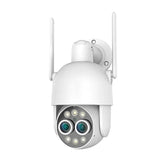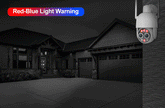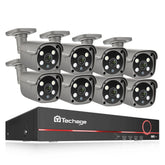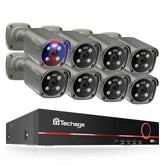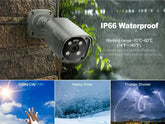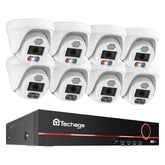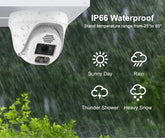IP Cameras in Retail Environments: Reducing Loss and Enhancing Customer Safety
In today's rapidly evolving retail landscape, ensuring customer safety and minimizing losses are critical concerns for retailers. To address these challenges, many retailers are turning to advanced surveillance technologies such as IP cameras. IP cameras offer a range of features and capabilities that can greatly enhance security in retail environments. This article explores the role of IP cameras in reducing losses and enhancing customer safety in retail settings, highlighting their benefits and key considerations for implementation.
Preventing Theft and Shoplifting:
One of the primary advantages of IP cameras in retail environments is their ability to prevent theft and shoplifting. Strategically placed cameras with high-resolution video capabilities provide comprehensive coverage of sales floors, aisles, and checkout areas. The presence of visible IP cameras acts as a deterrent, discouraging potential thieves and reducing the likelihood of theft incidents. Moreover, in the event of a theft, IP cameras capture valuable evidence that can aid in identifying perpetrators and recovering stolen merchandise.
Suspicious Behavior Detection:
Video analytics algorithms integrated into IP camera systems can analyze video feeds in real-time to detect suspicious behaviors. These algorithms are trained to recognize patterns associated with activities such as loitering, aggressive behavior, or unusual movements. When such behaviors are detected, the system can trigger instant alerts to notify security personnel, allowing for immediate intervention. By identifying potential security threats early on, retailers can prevent incidents from escalating and minimize losses.
Facial Recognition:
Facial recognition technology is another powerful smart feature that can be integrated into IP camera systems. By analyzing facial features captured in the video footage, the system can compare them against a database of known individuals, such as known shoplifters or persons of interest. When a match is found, security personnel can be alerted, enabling them to take appropriate action. Facial recognition technology adds an extra layer of security by helping identify individuals with a history of fraudulent activities or theft.
Real-time Monitoring and Incident Response:
IP cameras enable real-time monitoring of retail spaces, empowering store personnel to promptly respond to potential security incidents. With live video feeds accessible from a central monitoring station or remotely, security personnel can quickly detect suspicious activities, unauthorized access, or other security breaches. Real-time monitoring allows for immediate intervention, minimizing the impact of incidents and ensuring the safety of customers and staff.
Employee Safety and Training:
IP cameras not only protect customers but also contribute to employee safety. By monitoring employee-only areas, such as stockrooms and break rooms, IP cameras can help prevent internal theft, unauthorized access, and potential workplace hazards. Moreover, recorded footage can be used for employee training purposes, enabling managers to identify areas for improvement and enhance security protocols.
Remote Accessibility and Multi-site Monitoring:
IP camera systems provide retailers with the convenience of remote accessibility and multi-site monitoring. Retailers can access live feeds and recorded footage from their IP cameras using dedicated software or web-based interfaces, regardless of their physical location. This feature allows for centralized monitoring of multiple store locations, streamlining security operations and facilitating a proactive approach to risk management.
Video Analytics and Smart Features:
Advanced IP camera systems often incorporate video analytics and smart features that further enhance security in retail environments. Video analytics algorithms can detect suspicious behaviors, such as loitering or unusual movements, and trigger alerts for immediate attention. Additionally, smart features like facial recognition can be used to identify known shoplifters or individuals with a history of fraudulent activities, providing an extra layer of security.
Facial Recognition:
Facial recognition technology is another powerful smart feature that can be integrated into IP camera systems. By analyzing facial features captured in the video footage, the system can compare them against a database of known individuals, such as known shoplifters or persons of interest. When a match is found, security personnel can be alerted, enabling them to take appropriate action. Facial recognition technology adds an extra layer of security by helping identify individuals with a history of fraudulent activities or theft.
Inventory Management and Operational Efficiency:
IP cameras can contribute to improved inventory management and operational efficiency in retail environments. By monitoring stockrooms, warehouses, and supply chain processes, retailers can detect discrepancies, track inventory movements, and identify areas where operational improvements can be made. IP cameras with advanced features, such as barcode scanning or RFID integration, enable real-time tracking of merchandise, reducing inventory losses and streamlining inventory management processes.
Queue Management:
Long checkout queues can lead to customer dissatisfaction and potential revenue loss. IP cameras with queue management capabilities can analyze video feeds to estimate the length of queues and waiting times. This information can be relayed to store personnel, allowing them to allocate resources more efficiently and ensure prompt customer service. By improving the checkout process, retailers can enhance customer satisfaction and increase operational efficiency.
Liability and Incident Investigation:
In the unfortunate event of an incident, such as a slip-and-fall accident or customer dispute, IP cameras can provide valuable evidence for liability purposes. The high-resolution video footage captured by IP cameras offers a clear and objective record of events, helping to resolve disputes and protect the interests of both customers and retailers. This evidence can be crucial in insurance claims and legal proceedings, reducing potential liabilities for retailers.
Privacy Considerations and Ethical Use:
While IP cameras offer significant benefits, it is essential to consider privacy concerns and ensure their ethical use in retail environments. Retailers must adhere to privacy regulations and inform customers about the presence of surveillance systems through visible signage. Additionally, measures like anonymization or masking can be implemented to protect customer privacy while maintaining security.
IP cameras have become invaluable tools for enhancing customer safety and reducing losses in retail environments. With their deterrence capabilities, real-time monitoring, remote accessibility, video analytics, and operational efficiencies, IP camera systems contribute to a safer and more secure shopping experience. However, retailers must balance the use of IP cameras with privacy considerations, ensuring compliance with regulations and adopting ethical practices. By leveraging the power of IP camera technology responsibly, retailers can create a secure environment that fosters trust, enhances customer satisfaction, and ultimately drives business success.




